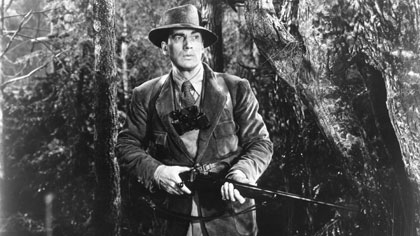Primary navigation


Fritz Lang; US 1941; 20th Century Fox / Region 1; 102 minutes; Aspect Ratio 1.33:1; Features: audio commentary by Patrick McGilligan, making-of, trailer, advertising, restoration comparison, promotional art and stills galleries
“Somewhere in Germany, shortly before the war”, British big-game hunter Alan Thorndike (Walter Pidgeon) locates a scenic ridge in the mountains that allows him to frame Adolph Hitler, brooding on an adjacent balcony, in the crosshairs of his unloaded rifle. He squeezes off an imaginary shot, just for the thrill of it… then decides, on the spur of the moment, to load his weapon and really do the deed.
It isn’t until we reach the other end of Fritz Lang’s Man Hunt that Thorndike, an avowed pacifist who no longer kills the animals he hunts, finally understands what motivated this fateful change of heart – but in the meantime he is caught, arrested and interrogated by monocled Gestapo man Quive-Smith (George Sanders), himself a strutting gamesman who recognises his illustrious prisoner by sight. He offers to set Thorndike free if he’ll sign a document stating that he was sent to Germany as an assassin by the British government – which is untrue, and which he refuses to do. Subsequently beaten and pushed off the same ridge to his presumed death, Thorndike survives and stows aboard a Danish freighter also carrying a sinister passage-paying Nazi (John Carradine, even more menacing than he was as ‘Baron Latos’ in House of Dracula) who has claimed Thorndike’s identity and passport. Back in a London generously peppered with bit players from Universal’s Sherlock Holmes series, Thorndike finds his homeland equally lousy with Nazis and spies, marauding as everything from taxi drivers to little old ladies, as Quive-Smith taunts his every fugitive step by telephone. Thorndike is saved from near-capture when he fortuitously bumps into Cockney seamstress Jerry Stokes (Joan Bennett, in the first of four films as Lang’s star and muse), a rewritten prostitute whose arrival heralds comedic contrast with Thorndike’s staid upper-crust acquaintances, a whiff of sentimental romance and the opportunity for patriotic tragedy.
Based on the popular 1939 novel Rogue Male by Geoffrey Household (which sprang from a story published in the Atlantic Monthly) and inherited from John Ford as he busied himself with The Grapes of Wrath, Man Hunt was Fritz Lang’s sixth American film and the picture that reconsecrated a devotion to paranoid thrillers which would carry
him through his next eight pictures and beyond. Set before Britain declared war on Hitler’s Germany in September 1939 and released six months before the US entered the fray after the attack on Pearl Harbor, Man Hunt not only despises the Third Reich but also takes a quietly contemptuous stance towards America’s own reluctance to declare itself Hitler’s enemy, mirrored back at the American moviegoer by the narrative’s depiction of Britain’s reticence (permissible criticism in light of a Neutrality Act forbidding US films of the time to endorse Britain’s war involvement). The closing shot, which depicts a British airdrop of armed soldiers over Germany, is brazenly scored with ‘America the Beautiful’, an ingenious circumvention of such ‘endorsement’.
Though not one of Lang’s best films, Man Hunt is worth seeing as a catalogue of cinematic invention, as well as a keen-eyed political statement. The first 17 minutes alone are a remarkable demonstration of how to sustain interest against the grain. We open with a long, disembodied tracking shot through a studio wood, incorporating two easily overlooked dissolves that may well condense what was once a still more extended shot, taking its sweet time to introduce the human element; after Thorndike’s capture, the film continues on for a full eight minutes before the first word of English is spoken; and following Thorndike’s beating, he is dragged into Quive-Smith’s presence for a scene in which George Sanders is the only actor shown in a room full of other men’s silhouettes. The film’s highlight, aside from the sweet business between Bennett and Pidgeon, is a suspenseful sequence of Thorndike being stalked by the cane-dagger-wielding Carradine through the tunnel of a magnificent London Underground station set.
Included on Fox’s disc is the uncredited Rogue Male: The Making of Man Hunt, which manages to corral such published Lang experts as Patrick McGilligan, Paul M. Jensen, Kim Newman and Dr Drew Casper but emphasises remarks from Mel Brooks screenwriter Steve Haberman, whose bland closing remarks come right after a gleeful Newman fires off what feels like the more rightful final word. The theatrical trailer is an unexplained reconstruction of sorts, with no onscreen text and the dialogue wiped from the first minute. As usual with Fox ‘restoration comparisons’, one is hard-pressed to find much fault with the unrestored side of the screen, apart from some gatefloat in one segment. The film itself looks fine, but the audio is meticulously centred and without much depth.
The feature commentary by Patrick McGilligan, author of the 1997 biography Fritz Lang: The Nature of the Beast, is divided between text readings and improvisations to fill the gaps. The pre-scripted portions contain some parenthetical hearsay and innuendo, as well as outright mistakes (Roddy McDowall’s charmingly overplayed bit part as the cabin boy was not his first screen role), which gradually erode listener confidence. In addition to finding a good deal of fault with a film he terms a ‘masterpiece’, McGilligan fails to tag some important grace notes, such as the farewell kiss that Thorndike subtly blows to Jerry on the bridge where they last meet, or the fact that Lang frames it with the hero’s back turned to camera, thus giving the moment tender sentimentality without making Hollywood’s usual vulgar meal of it. Lang pulls this punch more than once in the scenes involving these two characters, and his refusal to parade or burlesque what is sacred between them is key to this uneven film’s nagging, undismissable quality.
Fritz Lang: The Illusion of Mastery: Thomas Elsaesser puts the case for the Dr. Mabuse trilogy as a radical critique of surveillance culture